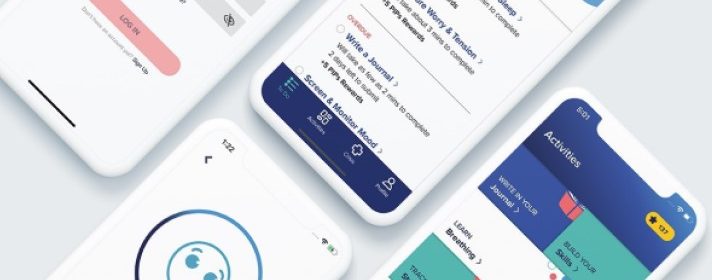At pain group, a mobile app helps collect data and improve mental health

Cutting Edge Integrative Pain Centers, a group of three pain management clinics in Indiana, looks at pain from a holistic standpoint, taking into consideration factors such as mood, sleep, functionality and more. They’re all in play when it comes to providing care.
THE PROBLEM
Because of this approach, members of the center’s staff were doing quite a lot of assessment, beyond just the Patient Health Questionnaires and behavioral health screenings, to get a baseline of the patients coming into the practice. But nearly all of the assessments were being done in the office, creating a bottleneck for the practice and impacting overall workflow.
“We were looking for solutions that could both automate a lot of these time-consuming processes and help us better connect with our patients when they weren’t in the office,” said Dr. Orlando Landrum, owner of Cutting Edge Integrative Pain Centers. “For behavioral health and pain, we’re rarely just seeing patients once a month, but really trying to get a better understanding of who you are and how your conditions are changing or improving.”
PROPOSAL
Once staff learned they could automate a lot of these screenings and data collection to get a more complete, longitudinal understanding of patient health – instead of just a snapshot – they thought it made sense to go with vendor NeuroFlow for help.
“In my experience, with pain patients, it’s a population that is underserved; they’ll get an injection or a surgery, but most doctors don’t look at how this pain impacts their patients from a mental standpoint,” Landrum stated. “Too often, patients are afraid to voice that they hurt, because people will consider them to be weak or whiners, we just see a lot more barriers to break down with them in terms of engagement and care coordination.”
An IT tool like NeuroFlow gives patients a safe space to open up about their condition and be proactive about working on their mental wellness, he explained.
MARKETPLACE
There are not many mobile apps precisely like NeuroFlow on the market today, but there are many apps that can be used by patients to help with monitoring and improving mental well-being. Some of these apps include Calm, Headspace, Mood Kit, Moodnotes, Moodpath, Optimism and What’s Up.
MEETING THE CHALLENGE
“One of our MAs will introduce the tool to the patients and then typically another member of the team helps them download the app and shows them the functionality of what they can do with it: guided meditations, breathing exercises, journaling, mood and sleep tracking, video and audio content, and more,” Landrum said.
“It’s helpful for patients who can see or notice spikes in their pain but then doing techniques on the app to help manage or reduce them,” he explained. “Then, in addition to assigning out activities and assessments, the MA will monitor and track the progress of the patient to really help close the loop on the care.”
This is critical for the provider organization – when providers on the platform receive relevant alerts and reach out to patients, the patients are often pleasantly surprised and grateful that the caregivers are paying close attention to their well-being, Landrum said. That is critical to cementing a rapport with patients, he added.
RESULTS
Once patients get into the flow of using the technology, they quickly see the benefits, and some even find it cathartic, Landrum said.
“Overall, patients using it have had much better satisfaction and improved results when it comes to mental health symptoms; for them, it’s a win-win, they’re getting personalized tools and resources to manage their mental wellness, and it doesn’t cost them anything,” he explained.
“We were looking for solutions that could both automate a lot of these time-consuming processes and help us better connect with our patients when they weren’t in the office.”
Dr. Orlando Landrum, Cutting Edge Integrative Pain Centers
“For one of our patients, it changed the course of her life. She had a handful of issues, both medically and personally, but she told me how the breathing exercise helped her feel more centered and reflective of where she is in the moment and not letting her negative thoughts take control.”
There always will be some pushback when introducing something new to patients, Landrum added.
“Some of our older patients felt daunted by technology, so just like we do for telemedicine, our staff will help with training to bridge that gap or even reach out to and work with their social support team to do so,” he said. “To us, having a tool that helps us stay engaged and connected to our patients is so important that we’ve actually lost or discharged patients who weren’t willing to use it.”
That is not an easy decision to make, but staff has seen the results and impact, and they want patients to understand the important connections between mental and physical health for their treatment and care plan, Landrum explained.
ADVICE FOR OTHERS
“Other clinicians I’ve spoken to about NeuroFlow are excited about technologies like this that simplify and automate the collection of patient data; that is important to us as providers but can sometimes be time-consuming,” Landrum said. “Additionally, offering tools and technologies that enhance the patient experience can be a selling point and competitive differentiator for your practice.”
For Cutting Edge Integrative Pain Centers, he concluded, the organization now has a tool that shows how committed it is to establishing and cementing an ongoing relationship with patients to help them feel better, faster.
Twitter: @SiwickiHealthIT
Email the writer: [email protected]
Source: Read Full Article
